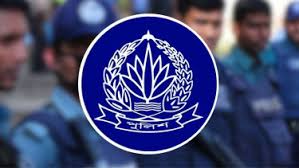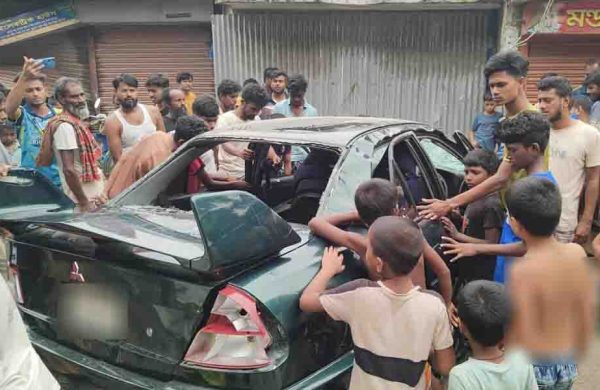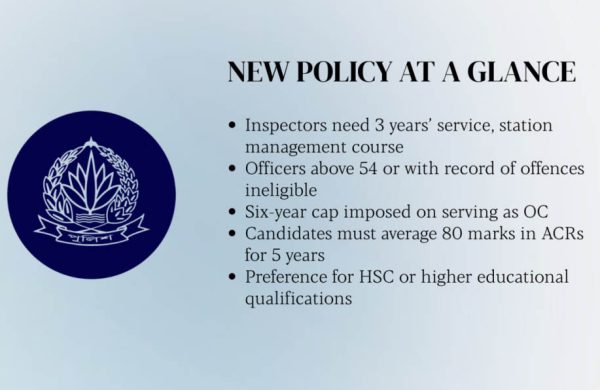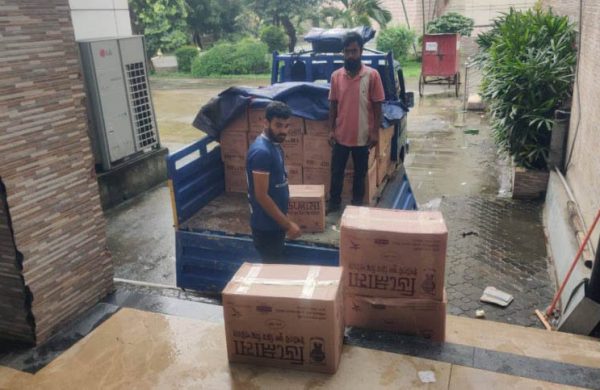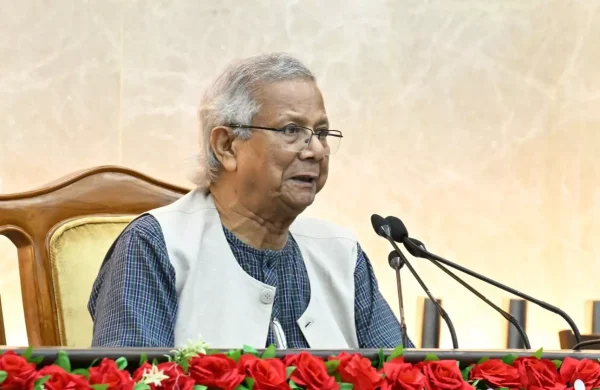India Cannot Afford NOT to Pursue Relations with Interim Government
- Update Time : Saturday, September 14, 2024
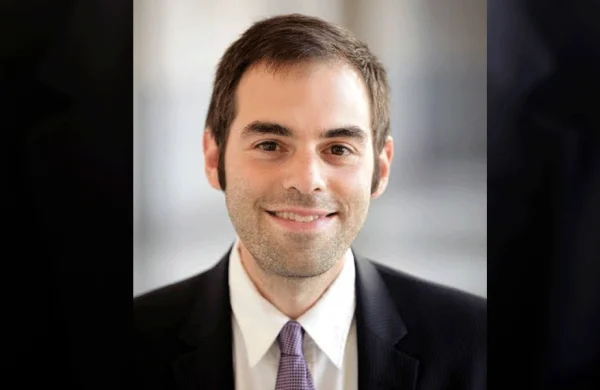
TDS Desk:
Director of the South Asia Institute at the Wilson Center in Washington, Michael Kugelman (MK), is considered a crucial analyst of South Asian affairs in the United States. His keen observation and sharp opinion have always been significant in assessing western thoughts about this part of the world. Editor and co-editor of 11 books, he writes analytical columns for The New York Times, Foreign Policy, Foreign Affairs, and other mainstream publications. A month after the ouster of the fifteen-and-a-half-year Awami League regime, Kugelman shares his observations on post-Hasina Bangladesh and its relations with great powers in an exclusive interview with Rajib Kanti Roy
The deep discontent against Sheikh Hasina was evident in the participation of people in the recent movement but the way her government collapsed and she fled was surprising to many. What mistakes did she make and how do you view those?
Her biggest mistake was going way too far with the repression. So many times previously, she was able to quell peaceful protests by using an iron fist. But in this case, the amount of retaliatory force was just too much, and especially against a backdrop of so much pent-up public anger. Her security forces fired live rounds that shot protestors in the head. They fired on crowds from helicopters. So many people were killed. This not only prompted the public to turn back on her, but also, in the end, the army. And that sealed her fate.
Your take on the great powers’ reactions to the toppling of the Awami League government
There was a lot of surprise in many capitals, given how quickly she was ousted. In terms of the great powers, China and Russia had good relationships with Hasina but they surely know that whatever government is in power in Bangladesh will be keen to engage with them. Bangladesh takes the standard nonaligned position of the Global South in wanting to balance relations with many powers.
The US reaction was initially relatively muted, likely because of the sensitivities of the situation and not wanting to do or say anything that could create security risks for US personnel or interests in Bangladesh. It is notable that the State Department raised its travel advisory for Bangladesh to the highest level, where it remains today. Despite tensions with Hasina over democracy and elections issues, US-Bangladesh relations actually grew in a big way during the Hasina era. Still, Dr Yunus is someone with whom the US is comfortable. At the same time, one of the major consequences of the mass movement—the empowerment of Islamists and their supporters—will concern Washington, given that some of them harbor anti-American views.
Do you think that the dispute with the US cost Sheikh Hasina much more than she anticipated?
What cost Hasina was her own policies, especially relentless repression, along with an inability to curb the recent economic stress that further inflamed public anger against her and undercut Awami League narratives about overseeing Bangladesh’s growth story. She may well have fended off US attempts to disincentivise her from waging repressive policies, but in the end what did her in were her own actions.
Sheikh Hasina was reelected in at least three controversial and rigged elections in 2014, 2018 and 2024, backed by India. There is a school of thought that India’s stance was approved by the US, as the latter backtracked right before every poll and congratulated new governments, fuelling the allegation that the US looks at Bangladesh “through India’s eyes”. You may correct it if it is a misconception…
I have heard this view a lot but tend to push back against it. If the US really viewed Bangladesh “through India’s eyes”, why would it have pursued a policy for several years—public pressure on Dhaka for free and fair elections—that New Delhi did not like? Certainly, the US and India are close partners, and they see eye to eye on many things, including in the region, but Bangladesh is actually an exception. And that exception will likely remain prominent in the months ahead, as I imagine that the US will be much more comfortable engaging with Dr Yunus than will India.
You surely have observed the veracity of the recent statements issued by the two countries following a telephonic conversation between Joe Biden and Narendra Modi after the latter visited Kyiv. Is the US finally going to deal with the Bangladesh issue from a separate perspective?
There will continue to be some divergences between the US and India on Bangladesh. And those were on display in that Biden-Modi call: Biden’s main priority in that call was hearing about Modi’s visit to Ukraine, while Modi’s main priority was likely to express his concerns about the situation in Bangladesh. That is why Bangladesh was not mentioned in the US readout but was in the Indian one.
I do think, though, that while some US and Indian approaches to Bangladesh will be different, there will be some convergences on strategic levels. Both the US and India do not want Bangladesh to draw closer to China (though let’s not forget that Hasina brought Bangladesh quite close to China too), though that is a possibility with the new government in Dhaka. In fact that is likely one reason why the US eased up on public pressure on Hasina soon before the last election—to reduce the risk of driving Bangladesh further into China’s arms.
Also, while Indian security concerns about post-Hasina Bangladesh are greater than American ones, let’s be clear: They both worry about emboldened religious elements. You can be sure that the US would be concerned about al-Qaeda-inspired militants being released from jail.
Sheikh Hasina is accused of conducting a “mass killing” only to be in power. Lawsuits against her and her party stalwarts have piled up. The UN has announced it will investigate the incidents of human rights violations in Bangladesh. How can the US help the country in the investigation process?
I am not sure the US needs to help on this front. The new government in Bangladesh will be fully behind an investigation. The question is how much Hasina and her party would cooperate with one. The US would certainly support in principle an investigation, but it would not want to get involved. Not to mention it lacks the leverage to convince or compel the Awami League to cooperate in an investigation. India may have the leverage, but I doubt it would want to try to exert it, given how close an ally Hasina remains and not wanting to delve into such a sensitive matter for her and her party.
How does the US observe Sheikh Hasina’s refuge in India? Will it affect the US-India ally’s relations with Bangladesh’s new leaderships?
It is something the US will monitor but I do not expect Washington to push India on Hasina (even if Dhaka requests Washington to do so). It will view the situation as an internal matter for New Delhi. It is neither something that directly impacts US interests nor something that affects US-India relations.
The Awami League government released an Indo-Pacific Outlook balancing the US-led Indo-Pacific strategy and China-led Belt and Road Initiative. Do you think that its fall will bring any change in Bangladesh’s perspective of the Indo-Pacific strategy?
I expect to see a fair degree of continuity. You would not see this new government in Bangladesh openly embracing the “friendship to all, malice towards none” mantra, as it is so closely associated with the Awami League, but I do expect it to support the longstanding position of balancing ties with great powers. The new government will recognise that balancing ties with both powers bring unique benefits: Trade and strategic cooperation with Washington, and development and military collaborations with Beijing.
If it is to name a single country disturbed by the Awami League’s fall, it is India. The country’s continuous backing of Sheikh Hasina’s autocratic government has developed an intense anti-India sentiment across Bangladesh. How will India deal with it offering Sheikh Hasina refuge in Delhi for long?
Many in India will argue that New Delhi simply cannot afford to pursue relations with a government that has emboldened Islamists and other anti-India forces. I would argue the opposite: It cannot afford NOT to pursue relations with the new government, no matter the risks and concerns associated with it. India has important economic, strategic and security interests in Bangladesh, and it is hard to advance them by snubbing the new government there.
Generally speaking, New Delhi does not turn back on its close friends, so I anticipate it will try to host Hasina as long as its interests allow it to do so. But the longer she stays, the tougher it will be to build a relationship with the new government in Dhaka—and the higher the risk that Dhaka will make a formal extradition request. India has no intention of sending Hasina back to Bangladesh. New Delhi’s best hope is that eventually, an arrangement will be found whereby Hasina can move to a third country where her security will be assured.
After the changeover, the movement of Indian diplomats has lost pace in Dhaka. On the other hand, the Chinese ambassador is very active as he has sat in discussion with BNP after 12 years at its Gulshan office. He has also met leaders of Jamaat-e-Islami to reset its ties with the party. Apparently, Bangladesh is losing its balance towards the Red Dragon while India’s absence has created a vacuum for the US-led block. What role will the US play in recovering this space and maintaining its position in Bangladesh?
India’s compromised position would not necessarily hurt Washington’s place in the new post-Hasina set up in Bangladesh. Yunus is keen to work with the US, and Washington is very comfortable with him. I imagine we can expect some high-level US-Bangladesh engagements in the coming days and weeks, which will allow the two sides to get a better sense as to what they are looking for in the relationship. If Yunus travels to New York for the UNGA meetings, that may open up some possibilities for a few high-level conversations with US interlocutors.
A delegation led by Assistant Under Secretary for International Finance at the US Department of the Treasury Brent Neiman along with Assistant Secretary of State for South and Central Asia Donald Lu is coming to Bangladesh. What political message or offer of economic assistance they are bringing with them?
The US has long been a top commercial and humanitarian partner of Bangladesh’s: The US is a top export destination; one of the most generous providers of humanitarian aid, including for Rohingya refugees; it has been a top supplier of COVID vaccines; and the US has been a strong backer of IMF support (and other multilateral donor assistance) for Bangladesh. I imagine that the message that the delegation delivers will be in this spirit: In essence, the US has long worked with Bangladesh on these issues and it will continue to do so moving forward. I also anticipate a theme of continuity hitting on other issues—from strategic cooperation on Indo Pacific matters to climate change collaborations.
Is there any possibility of discussing the resumption of Bangladesh’s GSP facilities in the US market?
It is an important issue for Bangladesh, and I think there is a multipartisan consensus in Dhaka around the idea that resuming GSP would be a good thing—and especially at a moment when the economy has sputtered. This suggests it may be a discussion point during this visit, perhaps something that would come up in a broader discussion about trade cooperation.
What is your anticipation of the future of Rohingya repatriation in Myanmar after this changeover?
I imagine that in principle the new government will want to continue with the previous policy of negotiating for the repatriation of Rohingya refugees. But I think this government will be cautious, recognising that the war in Myanmar has gotten worse, that Rohingya are facing fresh threats in Myanmar, and that new flows of refugees into Bangladesh have been taking place.
What will help the new government here is Yunus: With his prominence and credibility abroad, he has the capacity to mobilise support and attention from the international community on the Rohingya issue. This is especially important in this era of global donor fatigue and other humanitarian crises in Ukraine and Gaza. It will be easier for Dhaka to commit to a slower and more gradual approach to repatriating Rohingya if it knows that more support and assistance is coming from the international community to help those Rohingya in Bangladesh.



